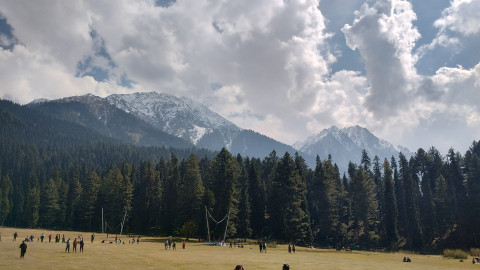Radical Socialist Statement on Operation Sindoor
Temas
Operation Sindoor marks a serious escalation in India–Pakistan hostilities, prompting concern over regional stability and civil impacts. Radical Socialist criticizes the strikes as politically driven and urges a peaceful, democratic resolution to the Kashmir conflict, warning against rising social divisions and militarized nationalism.

Hellohappy, CC BY-SA 4.0 <https://creativecommons.org/licenses/by-sa/4.0>, via Wikimedia Commons
The Indian Armed Forces have launched Operation Sindoor which has carried out strikes in as many as nine places spread over three cities in Pakistan occupied Kashmir and Punjab province while a counter-strike by Pakistan, also to be condemned, has led to lives lost in Poonch. All this is an extremely worrisome development, though not entirely unexpected. After the Pahalgam terror act which deserves to be universally and unequivocally condemned, the Modi government should have made public and transparent the information it has as to who the likely perpetrators are and accepted the call for an international investigation in which Indian involvement would be necessary and central and demanded that the Pakistan government participate in uncovering the complete truth so that the culprits can be caught and punished in the name of justice. A Pakistani refusal to cooperate in this manner would have put it in the dock internationally and then justified various actions that could be taken diplomatically and materially by India against the government but not against the welfare of the general Pakistani public.
Indeed, the most sensible approach and the one most damaging to the Islamabad government is precisely to drive an ever greater wedge between the Pakistani public and a government that is already deeply unpopular. Instead, by illegally holding the Indus Waters Treaty in abeyance and calling on all Pakistani citizens in the country (except non-Muslims with Long Term Visas) to immediately leave, this Hindutva government is pursuing the path of endorsing the collective economic suffering of the Pakistan public as well as endorsing the principle of the ‘collective guilt’ of all Pakistani Muslim citizens. First, this only reinforces anti-India jingoism within Pakistan and enhances public support for the military establishment which rules and seeks to drown out all progressive and dissident voices within, thereby eroding efforts to move towards greater democratic freedoms desired by the vast majority of its citizens. Second, these two steps by New Delhi are also taken with the aim of domestically whipping up a hyper-nationalistic frenzy (also the purpose of the pan-national civic military drills) that can benefit the BJP for the coming Bihar elections and more generally beyond this. In carrying out these cross border assaults by its official Armed Forces, New Delhi has entered the terrain of committing internationally illegal ‘acts of war’. This is the second time after Balakot that this has happened. It sets the precedent for this to happen again and again, only at a progressively higher military level should similar such terror acts by groups (i.e., non-state actors) take place which is all too likely despite our hopes.
Also, since the dawn of the nuclear age in 1945 it is only in South Asia that two nuclear powers have assaulted each other with conventional military weaponry creating a frighteningly real possibility of escalatory retaliation that can reach the level of a nuclear exchange. There is a large proportion of people in India, and a very bellicose, communal and loud right-wing media, that have been baying for blood since the ghastly act in Pahalgam. This creates conditions for much stronger calls for war both externally—with Pakistan and internally—against the imagined enemy within, namely the Muslims in general, and Kashmiris in particular. Pahalgam has pushed almost all political parties to stand behind the BJP. Leading members of the Congress, not unexpectedly, have been urging military action. Regrettably, the statements issued by both the CPI and CPI(M), after the launch of Operation Sindoor, have refused to oppose such military action. A similar situation arose in 2019, when India escalated the stakes and struck targets within the borders of sovereign Pakistan. We were lucky that the situation did not then escalate out of control. But there is no guarantee now that Pakistan will act in a manner which might lead to a situation where both India and Pakistan can claim victory and then let matters rest. If that does not happen, and if we go down the path of war, this will only mean further loss of lives on both sides of the border, and intense suffering on the part of those people who want war the least.
Radical Socialist opposes these military strikes because such acts do not go to the heart of the underlying political crisis of Kashmir, which has been exacerbated by the Modi regime since 2019. We condemn fanning the flames of Islamophobia by large sections of the media and organized right-wing forces, and the culpability that the government has shown on that front. Such military exchanges apart from the loss of innocent lives (state terror by each side), strengthens religious and political hatreds in both India and Pakistan. We hope that ordinary workers and people in both countries will stand on the side of peace and a political resolution of the Kashmir conflict, instead of seeking military solutions.